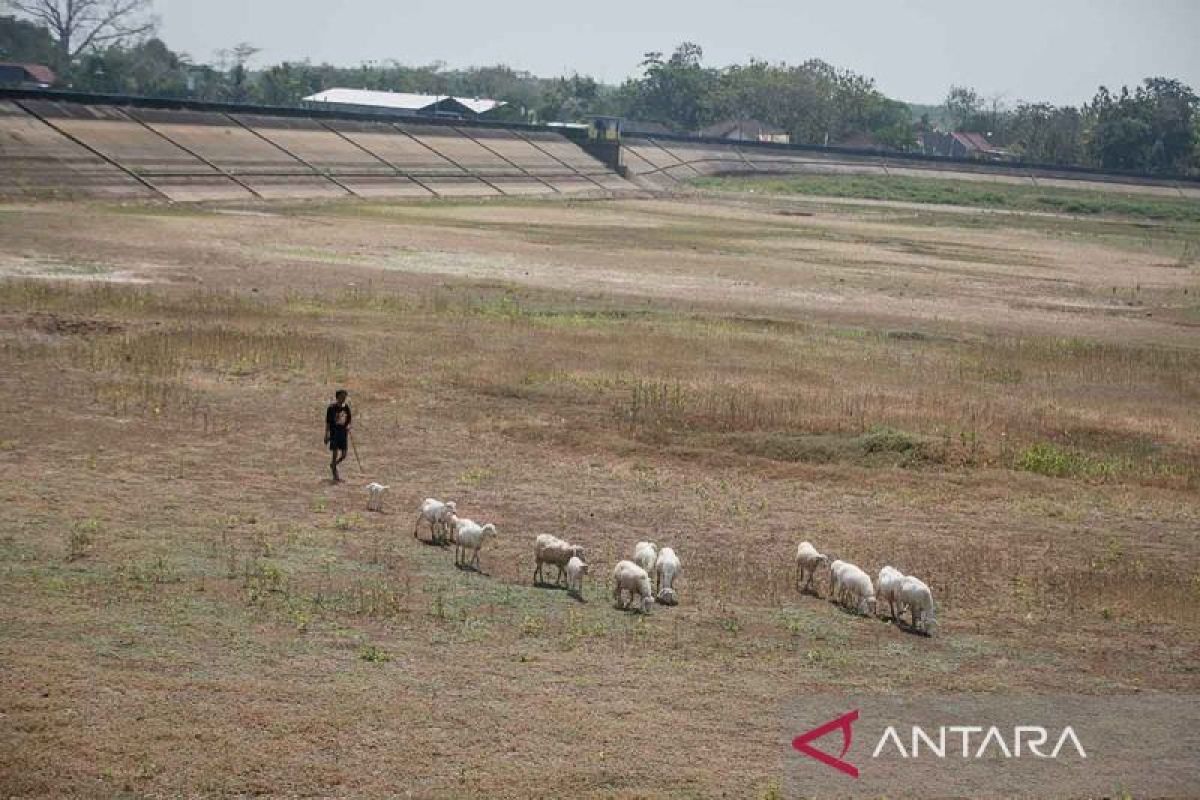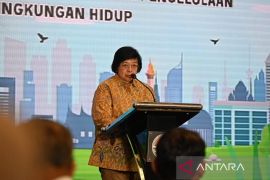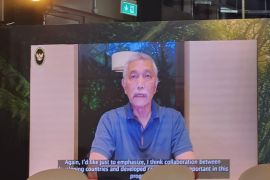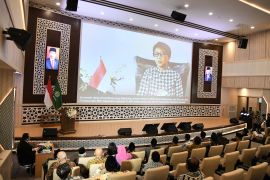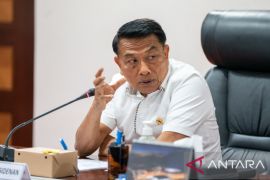President of ADB, Masatsugu Asakawa, stated that ADF 14 focuses on climate change adaptation, reducing disaster risks, increasing gender equality, and promoting regional cooperation and integration.Tbilisi, Georgia (ANTARA) - Climate crisis poses a major threat to sustainability and development progress, with women, children, and poor and vulnerable groups at major risk, in addition to small islands also in danger of being diminished.
To tackle this danger, the world needs to work together to overcome the climate crisis, including in terms of funding for climate actions or projects.
In current years, climate change may have caused drought and water pollution, thereby affecting the availability of clean water for meeting the people’s needs. Climate change also increases the Earth's temperature, disaster risk, and food insecurity. Coastal plains and low-lying areas will also be at risk of flooding.
As many as 19 of the 25 cities most affected if sea levels rise by one meter are in the Asia and Pacific region, while seven of them are in the Philippines. However, the country in the region most affected by coastal flooding is Indonesia, with around 5.9 million people impacted annually until 2100, according to an Asian Development Bank (ADB) report.
In the absence of action to address climate change, temperatures across mainland Asia are projected to rise by six degrees Celsius by the end of the century. Some countries could also be hit by much hotter climatic conditions, with projected temperature increases of up to eight degrees Celsius in Tajikistan, Afghanistan, Pakistan, and northwestern China.
Rising temperatures will bring drastic changes in the region, including weather systems; agriculture and fisheries sectors; land and marine biodiversity; domestic and regional security; trade; urban development; migration; and health. This condition will destroy any effort to achieving sustainable and inclusive development.
The infrastructure sector will also be affected by the impact of the climate crisis due to increased temperatures that would require more intense use of air conditioning, thereby heightening the load on the electricity network.
Hence, Indonesia, ADB, and other countries are contributing to increase the Asian Development Fund (ADF) 14. These funds will mainly be utilized to intensify efforts to overcome the climate crisis, alleviate poverty, and encourage socio-economic development inclusiveness.
The agreement to increase the funds was reached at the 57th ADB Annual Meeting in Tbilisi, Georgia, with a nominal value of US$5 billion.
Apart from Indonesia, other donor countries that contributed to raise the ADF 14 funds include Armenia, Australia, Austria, Canada, Denmark, Finland, France, Georgia, Germany, Hong Kong in China, India, Ireland, Italy, Japan, Luxembourg, Malaysia, the Netherlands, New Zealand, Norway, China, the Philippines, Portugal, Republic of Korea, Spain, Sweden, Switzerland, Chinese Taipei, Turkey, the United Kingdom, and the United States.
President of ADB, Masatsugu Asakawa, stated that ADF 14 focuses on climate change adaptation, reducing disaster risks, increasing gender equality, and promoting regional cooperation and integration.
ADF 14 prioritizes special assistance to small and vulnerable developing island countries, especially those more prone to climate change, and to countries in vulnerable situations affected by conflict.
Founded in 1974, ADF is dedicated to alleviating poverty and improving the quality of life in the poorest and most vulnerable countries in Asia and the Pacific. These funds are also utilized to overcome development challenges to realize sustainable development. The ADF reflects the collective commitment of ADB and donors for a sustainable future.
Support from donors increases the spirit of international cooperation during the global crisis. The collaboration between Indonesia, ADB, and other donors also bolsters the collective capacity to overcome challenges.
The collaboration is also expected to develop the Asia and Pacific region to become more resilient, inclusive, and sustainable.
In 2023, ADB committed a record US$9.8 billion in climate finance, up from US$6.7 billion in 2022 and including US$1 billion in non-governmental climate finance.
ADB is making significant climate investments in key sectors, such as transportation, amounting to US$2.5 billion; agriculture, US$1.8 billion; and energy, US$1.9 billion.
To encourage action towards a cleaner planet, ADB announced new technical assistance to the Just Energy Transition Partnership, as a form of assistance for Indonesians to switch from fossil fuels.
The technical assistance supports the formulation of investment plans and policies to channel the US$20 billion pledged to the partnership by public and private funding sources.
Indonesia and ADB also agreed on a commitment to accelerate the implementation of early termination for steam power plants (PLTU) in Indonesia being carried out within the framework of the Energy Transition Mechanism (ETM).
Addressing climate crisis proactively
In the Technocratic Draft National Medium-Term Development Plan 2020-2024 issued by the Ministry of National Development Planning (PPN) or the National Development Planning Agency (Bappenas), water scarcity on Java, Bali, and Nusa Tenggara islands is estimated to increase until 2030.
The report also stated by 2045, about 9.6 percent of the Java, Bali, and Nusa Tenggara regions would experience a water crisis, an increase from six percent in 2000.
Indonesia can also potentially suffer economic losses of up to Rp544 trillion (US$33 billion) during the 2020-2024 period due to the impact of climate change in the absence of policy interventions.
In 2021, a study stated that by 2050, Indonesia's climate change losses could reach 30-40 percent of the gross domestic product (GDP) if it is at moderate to high emission levels.
Hence, Indonesia is pushing efforts to tackle climate change and its impacts as a top priority in its development agenda. Likewise, ADB and the world are also prioritizing climate crisis handling in order to realize sustainable development.
According to Indonesian Vice President Ma'ruf Amin, Indonesia is proactive and continuously taking concrete actions to overcome the climate crisis through various strategic steps, including reducing greenhouse gas emissions.
This is in line with Indonesia's commitment in the Paris Agreement, namely increasing the target for reducing greenhouse gas emissions to 31.89 percent with its own capabilities and 43.20 percent with international support.
The increase in Indonesia's emission reduction target is in line with significant developments in the Indonesian policy, such as expanding nature conservation and restoration, implementing a carbon tax, achieving Forestry and Other Land Uses (FOLU) Net-Sink 2030, developing the electric vehicle ecosystem, and initiating the B40 biodiesel program.
To ensure funding for the energy transition, Indonesia has launched the Country Platform for Energy Transition Mechanism. However, any national efforts need consistent international support, including the realization of effective and equitable carbon markets, investment for energy transition, and funding for climate action.
The handling for climate crisis and its impacts needs joint cooperation from several countries that must be consistent and comprehensive, both through concrete actions and policies carried out by each country in its region, as well as collaborative joint efforts regionally and globally to realize a prosperous, sustainable, and advanced world.
Related news: Indonesia, ADB partner to speed up coal plant retirement
Related news: ADB provides development loan of US$500 mln to Indonesia
Translator: Martha Herlinawati S, Resinta Sulistiyandari
Editor: Arie Novarina
Copyright © ANTARA 2024
